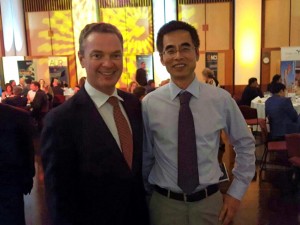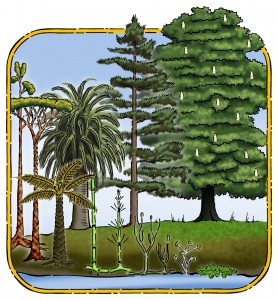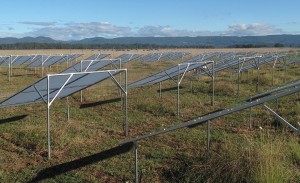- About
- Members
- Join
- Member log in
- Membership Renewal
- Member directory
- Life Members
- ASPS Life Member Professor Graham Farquhar
- ASPS Life Member Associate Professor Hendrik (Hank) Greenway
- ASPS Life Member Dr Marshall (Hal) D Hatch
- ASPS Life Member Dr Paul E Kriedmann
- ASPS Life Member Dr Mervyn Ludlow
- ASPS Life Member Emeritus Professor Rana Munns
- ASPS Life Member Conjoint Professor Christina E Offler
- ASPS Life Member Professor (Charles) Barry Osmond
- ASPS Life Member Emeritus Professor John W Patrick
- ASPS Life Member Dr Joe Wiskich
- Corresponding Members
- Elected Fellows
- Events
- Awards & Funding
- Employment
- Publications
- Research
- Teaching
- Menu
Science Meets Parliament 2016
06 April 2016
| By Professor Yong-Ling Ruan at The University of Newcastle |
On behalf of Australian Society of Plant Scientists, I joined Science Meets Parliament (SMP) on the 1st and 2nd of March, 2016 in Canberra. The SMP aims to provide scientists unique opportunities to build mutual understanding and connections between scientists and parliamentarians and to better understand the policy making process connecting science and innovation that underpins Australia’s economic, social and environmental wellbeing.
|
Professor Yong-Ling Ruan, ASPS representative, and Hon Christopher Pyne, MP, and Minister for Industry, Innovation and Science at the Science Meets Parliament 2016 at the Great Hall of the Australian Parliament House in Canberra on the 1 March 2016. |
Day 1 of the SMP started with an opening address given by Professor Brian Schmidt (AC, Nobel Laureate and Vice Chancellor of ANU) at the Hotel Realm. Prof Schmidt analysed a broad aspects of Australian Science and offered a few ‘tips’ on how to talk to politicians. This was followed by a vivid discussion and debate on ‘How to turn your science into news’, presented by Kylie Walker (Australian Academy of Science), Paul Bongiorno (Network Ten) and Alison Carabine (ABC radio). The meeting continued with an ‘Interactive session’ on rehearsing for parliamentary meetings and concluded with a Gala dinner at the Great Hall in Parliament House where key note speakers, the Hon Christopher Pyne MP, (Minister for Industry, Innovation and Science) and the Hon Bill Shorten MP (Leader of the Opposition) addressed the audience outlining their policies and visions for the future of Australian science.
Day 2 featured face-to-face group meetings in Parliament House with Ministers, Parliamentary Members and Senators. Their were concurrent sessions on Science and Politics delivered by past and present Federal Chief Scientists, Professors Ian Chubb and Alan Finkel, respectively, as well as Aidan Byrne (ARC CEO Professor) and Senator Kim Carr (Shadow Minister for Higher Education, Research, Innovation and Industry).
The two-day event proved to be a very rewarding experience. It helped to better understand and appreciate the process of formulating science-related policies and decisions developed at the government level. It provided a unique opportunity to network with politicians, journalists and fellow scientists while advocating plant science to the broader community. To the latter, I attached here a photo with the Science Minister Chris Pyne at the Gala diner following his keynote speech and our informal discussion.
Email: yong-ling.ruan@newcastle.edu.au
Science and Technology March newsletter and GPC March E-bulletin
03 April 2016
|
||||||||||||||||||
|
||||||||||||||||||
|
|
|||||||||||||||||||||||||||||||||||||
|
|||||||||||||||||||||||||||||||||||||
|
|||||||||||||||||||||||||||||||||||||
|
Leaf respiration in a warmer world is substantially lower than previously thought
22 March 2016
By Sebastian Pfautsch
ASPS Representative ‘Environment and Ecophysiology: Global Change’
Hawkesbury Institute for the Environment, Western Sydney University
Every year plants respire about 64 Gt CO2 back into the atmosphere. That is six times as much as released from burning fossil fuels. Obviously, small proportional changes in the respiratory flux can result in dramatic changes in atmospheric CO2 concentrations and associated warming effects.
Plant respiration (R) is positively correlated to temperature (T). Plant scientists have believed that R will accelerate under global warming, generating a feed-forward loop where plant-respired CO2 leads to even faster rates of warming, that lead to even greater fluxes of R and so on. Clearly, this scenario, where plants are responsible for faster rates of global warming is a scary one. Should plants be put into the limelight of being irresponsible climate sinners? Have plants worked out an evil plan to overthrow Homo sapiens? Are we all working for the enemy?
Rest assured, the short answer is no. The slightly longer answer, according to plant ecologist Peter Reich is “that we have no silver bullet to stop global warming, but recent research on the temperature-R relationship provides a silver lining in an otherwise dark sky”.
Recently Peter published new research findings on plant R in Nature (http://www.nature.com/nature/journal/vaop/ncurrent/full/nature17142.html ). He and his team grew 10 North American tree species for five years in the field and measured an insane amount of R-to-T response curves of leaves. Trees were grown under ambient and warmed (+3.4 °C) conditions with and without canopy cover of dominant trees. When leaves of ambient trees were exposed to +3.4 °C warming for a short time, their rate of R increased by 23% compared to unwarmed leaves.
However, when R was measured in leaves that were constantly warmed, they respired 80% less than those plants that experienced only short-term warming. This indication of long-term acclimation of R to higher T has large implications for global simulation models that – until now – have falsely assumed that R increases exponentially when T is rising. Consequently, these models have grossly overestimated atmospheric concentrations of CO2 and associated rates of global warming.
Independent of the research in North America, two other studies have emerged that point in the same direction. A global team, spearheaded by colleagues from ANU (Heskel et al., 2016, published in PNAS) found that R did not increase exponentially as T rose along an environmental gradient reaching from the artic to equatorial biomes and covering 231 plant species. Most importantly, the shape of the response curve of R-to-T was similar for all species, pointing to a universally applicable sensitivity of leaf metabolism to T. Earth system modellers must have a field day as these results make life so much easier…
The second study I’d like to point out is the work by John Drake and colleagues, accepted for publication in New Phytologist. This work brings R-to-T responses home to Eucalyptus trees. 12 Forest Redgum trees were grown in 10 m tall whole-tree chambers in Richmond, of which half tracked ambient temperatures, the other half ambient +3 °C warming. Instrumentation of the chambers allowed John to track gas exchange of the trees on a day-to-day basis at high temporal resolution.
Results from these Redgums agreed with Peter’s work on North American trees. R did not increase with warming. Furthermore, the Redgums responded to warming by decreased photosynthetic carbon assimilation. This means that – although indirectly – warming may increase atmospheric CO2 concentrations, but not due to increased R rather than decreased assimilation of C. In the experiment this led ultimately to a small increase in the ratio of R-to-photosynthesis, but only during heatwaves.
John says “these gum trees happily adjusted their physiology to cope with warming during most conditions, but heat waves were different. The gums shut their stomata and waited out the heat, but in the process they lost a lot of C to respiration without gaining any via photosynthesis”. In a global warming perspective this means that higher atmospheric CO2 concentrations could be the result of decreased uptake of CO2 by trees during the more frequent and intense heat waves predicted for our future in Australia.
The capacity of plants to acclimate to higher temperatures without exponentially increasing R is great news for the modelling of the earth system. As Peter puts it, acclimation of R to temperature only represents “a delay in the race to the climate change cliff”. However, we must consider that ecosystem R is much more than leaf R. At least John’s paper reports R of the woody proportion of trees (R is slightly increasing with warming). Leaf R represents roughly 50% plant R, with fine roots being responsible for the majority of the other half. We know little about acclimation of R in fine roots.
We know even less of acclimation of R in soil microbial biomass. And on a ecosystem scale consider that: while under hot and dry conditions plants would close stomata, leading to reduced uptake of CO2 while R remains relatively constant, soil microbial activity would slow down, autotrophic R would decrease and soils would retain more C. How does that affect atmospheric concentrations of CO2?
It gets complicated really quickly if we leave experimental units and enter the real world where plants have to deal with competition for resources (e.g. light, water, nutrients), grow fast or slow, tolerate shade more or less, age, etc. And on top of all that, even one of the world’s most distinguished plant ecologist admits that we don’t even know how acclimation exactly modifies enzymatic and biochemical processes. Nevertheless, pushing the boundaries of our understanding of R-to-T responses remains important work.
The seminal work of Owen Atkin and Mark Tjoelker 13 years ago (published in TiPS) defined the current framework of leaf acclimation. The three most recent studies about R-to-T responses and their implications to the earth system are tribute to an ever-progressing understanding of the effects of global warming on the natural world.
And besides all the great results, the work by Reich, Heskel and Drake and their colleagues is proof of the importance of well-funded, long-term and field-based research programs – a type of plant science that is pushed towards extinction. So, are plants winning after all? Take a deep breath and … respire.
Upcoming events, employment opportunities and GPC January E-bulletin
08 February 2016
Your current membership is paid to [wpmlfield name=”paidtodate”] (year, month, day).
We have several new events including;
- The Fourth International Conference on Plant Vascular Biology
- 37th New Phytologist Symposium: Plant developmental evolution
- 38th New Phytologist Symposium: Colonization of the terrestrial environment 2016
New employment opportunities include;
- Postdoctoral researcher position on nanobiotechnology in Riversdale, U.S.A.
- Postgraduate Student Internship Awards in Adelaide and Canberra
- IMPRS-MPI Doctoral Fellowships in Berlin/Potsdam, Germany
|
||||||||||||||||||||||||||||||||||
|
||||||||||||||||||||||||||||||||||
|
||||||||||||||||||||||||||||||||||
|
38th New Phytologist Symposium: Colonization of the terrestrial environment 2016
20 January 2016
38th New Phytologist Symposium:
Colonization of the terrestrial environment 2016
25-27 July 2016, Bristol, UK
Travel grant submission deadline: Thursday 21st April 2016
Poster abstract submission deadline: Thursday 19th May 2016
The purpose of this symposium is to explore the contribution that plants and mycorrhizal fungi made to the colonization of the terrestrial environment. Building on the success of the 25th New Phytologist Symposium, the focus will be on exploring current uncertainties in four major themes:
1) Interrelationships;
2) Anatomy – developmental genetics;
3) Refining biogeochemical models to take account of the role of plants and fungi; and
4) Anatomy and physiology of early land plants – what can we learn from extant species?
The meeting will take place over three days in Bristol, UK. There will be a number of invited and selected talks (chosen from submitted poster abstracts). There will also be dedicated time for a poster session and conference dinner.
Keynote speakers:
Liam Dolan, University of Oxford, UK; Ned Friedman, Harvard University, USA; Tim Lenton, University of Exeter, UK
37th New Phytologist Symposium: Plant developmental evolution
20 January 2016
37th New Phytologist Symposium:
Plant developmental evolution

Beijing, China
Travel grant submission deadline: Thursday 25th February 2016
Poster abstract submission deadline: Thursday 17th March 2016
The relatively new field of plant evolutionary-developmental biology (‘evo-devo’) seeks to understand how and why plant morphological characters have evolved to produce the tremendous diversity of form in living plants. This meeting will draw together researchers in plant evo-devo for exchange of ideas, current research, and discussion of future directions for the field.
Sessions:
floral development; vegetative meristems, leaves, and inflorescences; plasticity and life history evo-devo; selected poster abstract talks.
Eighteen leading scientists will speak at the Symposium. We hope that this will stimulate focused discussion and the exchange of ideas at what will be a relatively small (around 120 delegates) and informal meeting. There will be a poster session, selected talks, discussion and a conference dinner.
Keynote speakers:
Beverley Glover, University of Cambridge, UK; Mark Rausher Duke University, USA; Miltos Tsiantis, Max Planck Institute for Plant Breeding Research, Germany.
Ninth Australian Conference on Grassland Invertebrate Ecology
15 January 2016
Ninth Australian Conference on Grassland Invertebrate Ecology
4-7 April 2016, Western Sydney University, Australia
The conference focuses on the biology, ecology and management of both pest and beneficial invertebrates in native and introduced grasslands including pastures, pasture/crop rotations and turf.
The Conference (grassbugs.com.au) will be hosted by the Hawkesbury Institute for the Environment at the historic Hawkesbury campus of Western Sydney University. The campus is nestled at the foot of the Blue Mountains and has been a hub of agricultural research and training since 1891. Grassland research, in particular, has featured prominently at the site with modern Australian grasses first used and developed on the Hawkesbury campus in the 1920s. The Conference will be held over three days including a half day field trip to the Royal Botanic Gardens in the Blue Mountains.
Report from Dr Samantha Grover, Plant Nutrition Trust Award recipient 2015
08 January 2016
5th International Symposium on Soil Organic Matter, Göttingen, Germany, September 20-25th
A whole week of soil organic matter! While many Europeans commented that it was a long way to come for a conference, the nine Australians lucky enough to attend SOM2015 all agreed that we found it thoroughly worthwhile. On the pre-conference field trip, Brian Wilson, Samantha Grover and a dozen other scientists visited peatlands under a range of agricultural uses and had fun flitting back and forth across the former border between East and West Germany. Schnapps tasting at a former convent ended the day but set the scene for the conference proper, which featured different local beers during the poster sessions every evening. Lynne Macdonald, Mark Farrell, Gaelle Ng, Tom Baker, BP Singh, Bhawana Bhatta and Jessica Ernakovich joined Brian Wilson and Samantha Grover to present a wide range of the SOM research from Australia. Outputs from the National Soil Carbon Program were abundant. The Australian contingent joined delegates from more than 50 countries, who presented 161 talks over four days, selected from more than 600 submitted abstracts. The bar was set high, with opening keynote addresses from Rattan Lal and Johan Six. All agreed that this high standard was maintained and the coffee (and beer) breaks were abuzz with animated conversation. Dr Grover’s talk on the effects of lime on the mineralisation of soil organic matter attracted considerable interest and connections were established with two authorities in this area. Ongoing research on peat soils was also strengthened by the first face-to-face meeting between Samantha Grover and Anna Normand, a PhD student from the University of Florida whom Dr Grover co-supervises. The next conference baton was passed on to Jennifer Dungait from Rothamstead Research, which will host the 6th SOM symposium in 2017. A post-conference workshop on SOM fractionation will result in a comparative trial of fractionation methods from laboratories around the world, with Lynne Macdonald accepting the trial soils to contribute CSIRO’s methodology to the study.
After the conference Samantha visited Dr Cordula Vogel and Professor Karsten Kalbitz at Dresden Technical University and gave a splendid talk to their Soil Science and Site Ecology group. Potential collaborations were discussed, a joint project proposal drafted and relationships between the two groups were even further strengthened. The valuable contribution from the Plant Nutrition Trust was well acknowledged in all presentations and it helped to attract matching funding from La Trobe University.
Samantha Grover and Brian Wilson with colleagues at a remnant of the fence dividing East and West Germany on the SOM2015 pre-conference field trip.
ASPS awards open and employment opportunity at James Cook University QLD
30 October 2015
Your current membership is [wpmlfield name=”membershiptype”] which is paid to [wpmlfield name=”paidtodate”] (year, month, day).
Announcing the call for applications for 2016 ASPS awards including;
2016 Peter Goldacre award, applications close November 30th 2015.
2016 ASPS Teaching Award, applications close November 30th 2015.
2016 RN Robertson Travelling Fellowships, Round I applications close November 30th 2015.
There is also a new employment opportunity at James Cook University click here for details.
and attached is an updated
Book your 2015 phenotyping experiment at The Plant Accelerator now
26 November 2014
Book your 2015 phenotyping experiment at The Plant Accelerator now
Do you work with crop plants? Are you interested in getting quantitative measurements of traits such as early vigour, nutrient and water use efficiency or salinity tolerance?
The Plant Accelerator is part of the NCRIS funded Australian Plant Phenomics Facility and offers high-throughput non-destructive phenotyping of crop plants in a greenhouse environment. Using automated imaging and watering systems, we can control the desired growth conditions while measuring their impact on plant performance and growth over time.
If you consider undertaking a phenotyping experiment at The Plant Accelerator in 2015, please contact us now to discuss your phenotyping needs and potential project.
We can provide advice on design and feasibility of your experiment and an itemised quote to help with budgeting or grant applications.
Especially if the time of year is important for your experiment, then contact us soon to ensure we can accommodate your project at the required time.
You can go online and fill out a request for quote: http://www.plantphenomics.org.au/services/accelerator/ or contact Drs Bettina Berger and Trevor Garnett at: bettina.berger@adelaide.edu.au; trevor.garnett@adelaide.edu.au;
We look forward to working with you in the future.
Recent Posts
Tags
Archives
- June 2025
- May 2025
- April 2025
- March 2025
- February 2025
- January 2025
- December 2024
- November 2024
- October 2024
- September 2024
- August 2024
- July 2024
- June 2024
- May 2024
- April 2024
- February 2024
- January 2024
- November 2023
- October 2023
- September 2023
- August 2023
- July 2023
- June 2023
- May 2023
- April 2023
- March 2023
- February 2023
- December 2022
- November 2022
- October 2022
- September 2022
- August 2022
- July 2022
- June 2022
- May 2022
- April 2022
- March 2022
- February 2022
- January 2022
- December 2021
- November 2021
- October 2021
- September 2021
- August 2021
- July 2021
- June 2021
- April 2021
- March 2021
- February 2021
- January 2021
- December 2020
- November 2020
- October 2020
- September 2020
- August 2020
- July 2020
- June 2020
- May 2020
- April 2020
- March 2020
- February 2020
- January 2020
- December 2019
- November 2019
- October 2019
- September 2019
- August 2019
- July 2019
- June 2019
- May 2019
- April 2019
- March 2019
- February 2019
- January 2019
- December 2018
- November 2018
- October 2018
- September 2018
- August 2018
- July 2018
- June 2018
- May 2018
- April 2018
- March 2018
- February 2018
- January 2018
- December 2017
- November 2017
- October 2017
- September 2017
- August 2017
- July 2017
- June 2017
- May 2017
- April 2017
- March 2017
- February 2017
- January 2017
- December 2016
- November 2016
- October 2016
- September 2016
- August 2016
- July 2016
- June 2016
- May 2016
- April 2016
- March 2016
- February 2016
- January 2016
- December 2015
- November 2015
- October 2015
- September 2015
- August 2015
- July 2015
- June 2015
- May 2015
- April 2015
- March 2015
- February 2015
- January 2015
- December 2014
- November 2014
- October 2014
- September 2014
- August 2014
- July 2014
- June 2014
Copyright 2017 Australian Society of Plant Scientists Disclaimer & Privacy
Website by Michael Major Media












